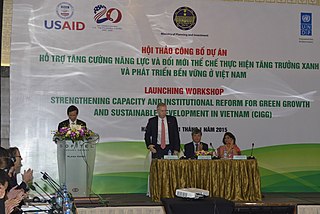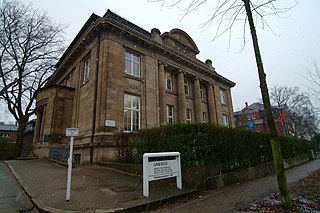Related Research Articles

A non-governmental organization (NGO) is an independent, typically nonprofit organization that operates outside government control. NGOs often focus on humanitarian or social issues but can also include clubs and associations offering services to members. Some NGOs, like the World Economic Forum, may also act as lobby groups for corporations. Unlike international organizations (IOs), which directly interact with sovereign states and governments, NGOs are independent from them.
The United Nations defines community development as "a process where community members come together to take collective action and generate solutions to common problems." It is a broad concept, applied to the practices of civic leaders, activists, involved citizens, and professionals to improve various aspects of communities, typically aiming to build stronger and more resilient local communities.

The Adventist Development and Relief Agency International is a humanitarian agency operated by the Seventh-day Adventist Church for the purpose of providing individual and community development and disaster relief. It was founded in 1956, and it is headquartered in Silver Spring, Maryland, United States.
The United Nations Volunteers (UNV) programme is a United Nations organization that contributes to peace and development through volunteerism worldwide.

Capacity building is the improvement in an individual's or organization's facility "to produce, perform or deploy". The terms capacity building and capacity development have often been used interchangeably, although a publication by OECD-DAC stated in 2006 that capacity development was the preferable term. Since the 1950s, international organizations, governments, non-governmental organizations (NGOs) and communities use the concept of capacity building as part of "social and economic development" in national and subnational plans. The United Nations Development Programme defines itself by "capacity development" in the sense of "'how UNDP works" to fulfill its mission. The UN system applies it in almost every sector, including several of the Sustainable Development Goals to be achieved by 2030. For example, the Sustainable Development Goal 17 advocates for enhanced international support for capacity building in developing countries to support national plans to implement the 2030 Agenda.

The U.S. African Development Foundation (USADF) is an independent U.S. government agency established by Congress in 1980 to invest directly in African grassroots enterprises and social entrepreneurs. USADF's investments aim to increase incomes, revenues, and jobs by promoting self-reliance and market-based solutions to poverty. USADF targets marginalized populations and underserved communities in the Sahel, Great Lakes, and the Horn of Africa. It partners with African governments, other U.S. government agencies, private corporations, and foundations to achieve transformative results.

The Rainforest Foundation Fund is a charitable foundation founded in 1987 and dedicated to drawing attention to rainforests and defending the rights of indigenous peoples living there.
ArabDev is a Giza (Egypt)-based non-profit organization that uses Information and Communication Technology (ICT) to "promote existing development projects and for innovative developmental initiatives". ArabDev provides women and youth with an educational venue for livelihood opportunities, through improved access to information and its use in skill development as well as small and micro enterprises.
The Comilla Model was a rural development programme launched in 1959 by the East Pakistan Academy for Rural Development. The academy, which is located on the outskirts of Comilla town, was founded by Akhter Hameed Khan, the cooperative pioneer who was responsible for developing and launching the programme.
Community media are any form of media that function in service of or by a community. It is the rise of all kinds of alternative, oppositional, participatory and collaborative media practices that have developed in the journalistic context of ‘community media,’ ‘we media,’ ‘citizens media,’ ‘grassroot journalism’ or any radical alternative to on and offline mainstream journalistic practices. In other words, it is having access to or creating local alternatives to mainstream broadcasting, like local community newspapers, radio stations, or magazines. Community Media aids in the process of building citizenship and raising social awareness. "Participation" and "access" are a large aspect in the rise of community media. Those who create media are being encouraged to involve themselves in providing a platform for others to express views. Community media is often given parameters when being defined by groups, but often challenges these boundaries with its broad yet narrow structure.

The Sustainable Sanitation Alliance (SuSanA) is a loose network of organizations who are "working along the same lines towards achieving sustainable sanitation". It began its work in 2007, one year before the United Nations International Year of Sanitation in 2008. The intention of creating SuSanA was to have a joint label for the planned activities for 2008 and to align the various organizations for further initiatives.

Village Earth: The Consortium for Sustainable Village-Based Development (CSVBD) DBA: Village Earth is a publicly supported 501(c)(3) non-profit, non-governmental organization (NGO) based in Fort Collins, Colorado, US. The organization works for the empowerment of rural and indigenous communities around the world with active projects with the Oglala Lakota on the Pine Ridge Indian Reservation in South Dakota, the Shipibo-Konibo of the Amazon region of Peru, India, Cambodia, and Guatemala. Village Earth is associated with the International Institute for Sustainable Development (IISD) at Colorado State University. Village Earth is also the publisher for The Appropriate Technology Library and The Appropriate Technology Sourcebook, a low-cost rural-development resource initiated by Volunteers in Asia in 1975 but transferred to Village Earth in 1995.

International health, also called geographic medicine, international medicine, or global health, is a field of health care, usually with a public health emphasis, dealing with health across regional or national boundaries. One subset of international medicine, travel medicine, prepares travelers with immunizations, prophylactic medications, preventive techniques such as bed nets and residual pesticides, in-transit care, and post-travel care for exotic illnesses. International health, however, more often refers to health personnel or organizations from one area or nation providing direct health care, or health sector development, in another area or nation. It is this sense of the term that is explained here. More recently, public health experts have become interested in global processes that impact human health. Globalisation and health, for example, illustrate the complex and changing sociological environment within which the determinants of health and disease express themselves.

The UNESCO Institute for Lifelong Learning (UIL), formerly UNESCO Institute for Education, is one of six educational institutes of UNESCO. It is a non-profit international research, training, information, documentation and publishing centre on literacy, non-formal education, adult and lifelong learning. It provides services to UNESCO's Member States, NGOs, and grassroots and community organizations, as well as to partners in civil society and the private sector. The Institute works in close collaboration with its Paris headquarters, with UNESCO field offices in different countries, with sister institutes and with national and international partners.

Community forestry is a participatory model of forestry that gained prominence in the 1970s in which local communities take an active role in forest management and land use decision making. Community forestry is defined by the Food and Agricultural Organization of the United Nations as "any situation that intimately involves local people in forestry activity". Unlike centralized management systems, community forestry more strongly emphasizes the participation and collaboration of local community stakeholders, along with government and non-governmental organizations (NGOs). The level of involvement of each of these groups is dependent on the specific community forest project, the management system and the region.
NGO-ization refers to the professionalization, bureaucratization, and institutionalization of social movements as they adopt the form of nongovernmental organizations (NGOs). It led to NGOs' depoliticizing discourses and practices of social movements. The term has been introduced in the context of Western European women's movements, but since the late 1990s has been employed to assess the role of organized civil society on a global scale. It is also used by Indian writer Arundhati Roy, who speaks about the NGO-ization of resistance, and more generally, about the NGO-ization of politics. Across the world, the number of internationally operating NGOs is around 40,000. The number of national NGOs in countries is higher, with around 1-2 million NGOs in India and 277,000 NGOs in Russia.
The UNESCO stated “education for sustainable development is a broad task that calls for the full involvement of multiple educational organizations and groups in bureaucracies and civil societies. These include Non-Governmental Organizations or NGOs.

The IBON Foundation is a non-profit research, education and information-development institution with programs in research, education and advocacy based in the Philippines. It provides socioeconomic research and analysis on people's issues to various sectors. It aims to contribute to people's empowerment through education and advocacy support. The foundation is also engaged in international solidarity work.
The International Hospital Federation (IHF) is an independent, not-for-profit, non-governmental organization based in Bernex, Switzerland. The IHF is a global membership association for hospital management that assists leaders of healthcare organizations and facilities in improving the standard, quality, and level of service delivery to improve the healthcare outcomes of people all over the world. The IHF provides a platform for the global healthcare community to share knowledge, ideas, and experiences, as well as identify international partnerships and collaboration opportunities. The IHF also represents the voice of hospitals and health systems on the global stage in initiatives, research, and joint statements with other global institutions and NGOs. Furthermore, the IHF established the Geneva Sustainability Centre in 2022 in response to the need for hospitals and healthcare services to address climate change.
Afghanistan is a World Bank Group member country. It has received financial support from the organization since 2002. The World Bank provides loans and grants to support its development and reconstruction efforts. The bank aims to help Afghanistan with matters such as poverty reduction, infrastructure development, education, and governance. Afghanistan collaborates with the World Bank on various policy initiatives and reforms to promote economic growth and stability.